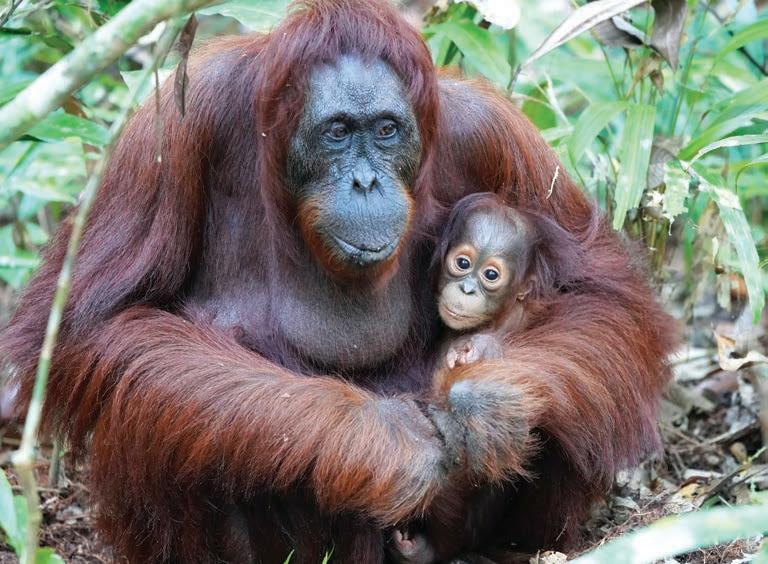
6 minute read
Health & Science
Research some time back linked co ee consumption with a reduced risk of developing Alzheimer’s later in life. However, researchers from the Krembil Brain Institute in Toronto, Canada were looking to see how. “Co ee consumption does seem to have some correlation to a decreased risk of developing Alzheimer’s disease and Parkinson’s disease,” Donald Weaver, co-director of the Krembil Brain Institute, said in a statement. “But we wanted to investigate why that is — which compounds are involved and how they may impact age-related cognitive decline.” With this in mind, the team of researchers designed an experiment looking at three di erent types of coffee — light roast, dark roast, and deca einated dark roast. ey performed tests to see how compounds in the co ee interacted with beta-amyloid and tau — proteins that are typically found in the brain when someone has Alzheimer’s or another age-related brain condition.
According to their ndings, a chemical compound in co ee called phenylindanes prevented the buildup and clumping of beta-amyloid and tau. Even further, dark roast co ee (both ca einated and deca einated) was found to contain the most phenylindanes, since the roasting process yields more of the compound. e researchers concluded, therefore, that dark roast co ee provides the best protection against cognitive conditions.
Advertisement
“It’s the rst time anybody’s investigated how phenylindanes interact with the proteins that are responsible for Alzheimer’s and Parkinson’s,” said Ross Mancini, PhD, one of the researchers on the study. “ e next step would be to investigate how bene cial these compounds are, and whether they have the ability to enter the bloodstream, or cross the blood-brain barrier.” e fact that this compound is naturally occurring rather than synthetically created, the researchers say, is an even more promising nding as we seek to develop new treatments for these conditions.
“Mother Nature is a much better chemist than we are, and Mother Nature is able to make these compounds,” said Mancini. “If you have a complicated compound, it’s nicer to grow it in a crop, harvest the crop, grind the crop out, and extract it [rather] than try to make it.”
So, the next time you’re at the grocery store, pick up the dark roast for your morning cup of joe. is way, you can be con dent that you’re getting a pick-me-up and also doing great things for your brain health in the long term.
Meantime, the next time you pick some fresh basil from your garden or the supermarket, remember that it’s great for your brain health! New research shows that fenchol, a natural compound in basil and other plants, may protect the brain against Alzheimer’s disease.
Fenchol is a type of terpene, or a naturally occurring compound, that gives the plant its signature scent. It’s the reason basil smells so heavenly. It’s also the reason basil and plants containing terpenes have antibacterial, antimicrobial, and antioxidant properties.
But why might fenchol reduce the risk of Alzheimer’s disease?
In the study published in the journal Frontiers in Ageing Neuroscience, researchers wanted to better understand the link between the gut microbiome and the brain. ey knew from previous studies that the microorganisms living in our digestive tract play a huge role in our metabolism, endocrine system, and immunity. ey also knew that those microorganisms release chemicals that improve brain health.
But could chemicals from outside the body improve brain health as well? With this question in mind, the research team theorised that fenchol protects the brain against Alzheimer’s disease.
Multiple neurochemical pathways link the gut to the brain. is means that the brain and the gut are constantly communicating. But how? According to a 2020 review, researchers believe that short-chain fatty acids play a big role. Short-chain fatty acids, or SCFAs, are a type of fatty acid in the digestive tract.
Microorganisms in the gut produce them as they ferment certain foods, speci cally dietary bers and resistant starch. (Resistant starch is a carbohydrate in grains, seeds, and legumes that resists digestion in the small intestine. It ferments in the large intestine instead.)
SCFAs travel through the blood to the brain. Once there, they activate a sensing mechanism on brain cells. As the Frontiers in Ageing Neuroscience study discovered, this activation causes the brain to start clearing out any abnormal buildup of Aβ protein. e Aβ protein is the main ingredient in ‘bad’ brain plaque, which builds up in the brains of Alzheimer’s patients.
What does all this have to do with fenchol? e researchers noticed that when they blocked the SCFA sensing mechanism, the brain developed an abnormal buildup of Aβ protein. So, they set out to nd a plant compound that could unblock the sensing mechanism.
Fenchol was the plant compound for the job. Of all the compounds that the researchers tested, it was the best at binding to the sensing mechanism. Even better, it signi cantly lowered the amount of Aβ protein in the brain. It also reduced the death of neurons.
Fenchol did something else extraordinary, too. Upon closer examination, researchers found that the plant compound decreased senescent neuronal cells, or cells that stop multiplying but don’t die o . So, they continue to release chemicals that trigger in ammation. e in ammation can spread and damage neighbouring cells. For this reason, scientists refer to them as “zombie” cells. Alzheimer’s patients often have these zombie cells in their brains.


Further study shows coffee wards off dementia

Orangutan not that far removed from humans
Orangutans are synonymous with their reddish-orange fur. But the ‘orang’ sound in their name has nothing to do with their distinct colouration: the name orangutan means ‘person of the forest’ in the Malay language. e moniker may be more accurate than we knew.
“ ey’re extremely intelligent, they’re very similar to us, they have cultures, they have prototypical behaviorus that are assumed to be precursive of language,” Dr Adriano Lameira told the online website Salon.
One of our closest living relatives, orangutans share 96.4% of their genes with humans. ese critically endangered great apes also share a similar knack for communication. Indeed, orangutans, like other great apes, have long been known to exhibit high levels of cognitive functioning. ey can recall and convey information about the past or the future to others, despite their solitary nature.
Now, scientists have human expression.
Intriguingly, orangutans that lived in densely populated areas expressed more individuality in their verbal communication style. Dr Lameira compared the e ect to the variety of fashion choices in a city.
“Like us, when great apes are exposed to di erent social settings, this moulds how they communicate — which is basically what happens when a person is learning a new language, as a child or an infant learning the mother tongue or later as an adult learning a second language.
“ ere seems to be a premium on novelty,” he described. “ ey tend to always search for new variants in the sound space that they can use. ey’re always picking new combinations and new in ection almost like an expression of individuality to stand out,” he said.
“Like us, when great apes are exposed to di erent social settings, this molds how they communicate — which is basically what happens when a person is learning a new language, as a child or an infant learning the mother tongue or later as an adult learning a second language,” Lameira continued.
Advertisement:
However, Lameira cautiously avoided describing verbal skills of orangutans or other great apes as a “language.” Still, his team’s ndings, published in Nature, suggest humans are not alone in our capacity for language development.
We just got there rst.
“ ere’s not much that differs us from these animals,” he asserted. “If they are open to social in uence as we are, then either they are a little bit more human than we thought, or we are a bit more ape than we would like to admit.” e dire conditions of orangutans and other great apes in the wild are a testament to a failure of human stewardship of our planet, much to the contrary of the human superiority complex.









